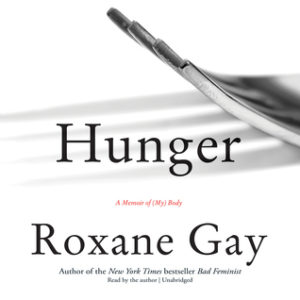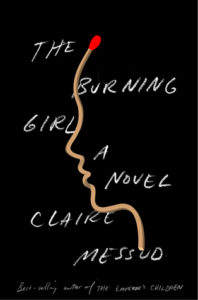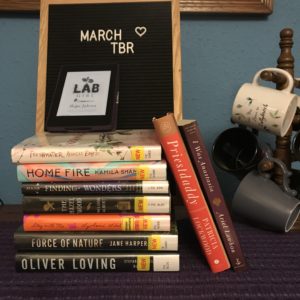The Books
I finished several excellent books this month—while I didn’t read exclusively from Black authors, I did try to include more of them this month than usual (I always try to make sure at least one of my books is from a POC each month) which pushed some books on my TBR closer to the top, though some of these bled into March since I didn’t finish them before the 28th. I did wind up reviewing most of the books I finished in February (or reviews are pending) so I have fewer books this month to briefly mention than I did last month. I finished We Were Eight Years In Power, This Must Be the Place, Interpreter of Maladies, Left Neglected, Caleb and Kit, An American Marriage, This Impossible Light, The Burning Girl, Lillian Boxfish Takes A Walk, He Said/She Said, We are Okay, and Hunger.
Hunger
 Hunger is Roxane Gay’s most recent work—a series of essays of varying lengths about food, her body, and hunger—for what she can and can’t have. Unlike Bad Feminist, Gay reads Hunger herself—an addition that made the audiobook more powerful than the text alone and why I went ahead and used the Audible credit. This is a book I think I will need to revisit a few times to really experience Gay’s writing and argument, largely because of the power and nuance here. I don’t want to assume I got everything out of this book the first time.
Hunger is Roxane Gay’s most recent work—a series of essays of varying lengths about food, her body, and hunger—for what she can and can’t have. Unlike Bad Feminist, Gay reads Hunger herself—an addition that made the audiobook more powerful than the text alone and why I went ahead and used the Audible credit. This is a book I think I will need to revisit a few times to really experience Gay’s writing and argument, largely because of the power and nuance here. I don’t want to assume I got everything out of this book the first time.
I loved Gay’s Bad Feminist so I knew I enjoyed her voice and writing. From Bad Feminist, I knew she had been raped and that had likely contributed to her current weight—a weight she clearly labels in Hunger as morbid obesity per the medical profession. Hunger made me feel conflicted—as a feminist with friends of all shapes and body types and with histories of disordered eating, I try my hardest not to judge people by their sizes. As someone who works with people who are involuntarily institutionalized, very little drives me as crazy as fighting with ten people trying to put my client on a diet she doesn’t want “for her health” while all of them are also as big as she is. I recognize marketing to women’s insecurities over their sizes while at the same time buying it—like knowing candy is bad and buying it anyway, I feel the pull of weight-shame marketing. Like Gay, I too was sucked into the myth of The Biggest Loser and wanted it all to be real. If I’m honest, I make snap judgments about people I don’t know while at the same time trying to espouse body-positivity and loving my friends who don’t meet America’s definition of “skinny.” (Full disclosure, I have a body type that many would consider “skinny” or “thin,” though I don’t consider myself skinny….thanks weight-shame marketing).
Gay’s set up left me feeling the pull of conflicting conclusions—something it seems Gay is perhaps herself left with. Part of Gay’s weight stems, as I noted above, from her rape. She wasn’t overweight and then she was literally gang-raped as a tween (I wouldn’t call it graphic but all the trigger warnings for this section). And then she became big—so big that maybe this flesh would become a fortress that would give her back the sense of safety she lost as a child. On the one hand she clearly recognizes that her weight was and remains to an extent, a holdover from her trauma. That when she starts to lose weight as she has several times, there reaches a point where she can’t be smaller, where the loss no longer feels safe and so she self-sabotages and gains the weight back. She acknowledges this and yet she also argues that her weight should not be viewed as a problem.
It is hard to reconcile Gay’s arguments that people should accept and accommodate her body because it is what it is and others have no right to judge it with her acknowledging that her size stems from a problem, from her trauma—a trauma that doesn’t seem like it’s fully healed (if it can be). And yet—perhaps this is the point. The sense of conflict comes from the tug of wanting to judge Gay for not addressing the source of her weight—if she did she could finally be thinner!—while at the same time knowing how hard that is in my own life. This pull to judge and not to judge ultimately leaves me with only one conclusion—Gay’s weight isn’t my problem. The person next to me on the airplane’s weight isn’t my problem. Whether they can help their size or not, whether choices have been made that led them here or not—they are not my problem. Indeed, it isn’t even my problem whether they think their weight is or isn’t a problem. Gay knows she has trauma. How she chooses to address it is up to her—and since her trauma isn’t affecting me, it isn’t on me to judge how she chooses to wear her flesh or, even, how her body makes choices for her.
For a purely practical takeaway, I had honestly never before paid attention to how the world is set up against larger people. Even with a boyfriend that tops six feet and two hundred pounds, I have had the thin-privilege of never paying attention to it. It never occurred me to that chairs with arms would be painful and turn dining from a pleasant meal with friends into a torturous evening that results in bruises. While my work has trained me to see more accessibility issues than I did before, I don’t really see weight as a disability and so I wouldn’t see a one-foot step onto a stage to be an issue for someone without a disability-related mobility impairment. I have been blind to the ways the world is set up against people who are large, to ensure the comfort of the thin and punish (yes—punish) those who aren’t. If I remember nothing else from this book several months from now, I hope that I can remember the sense of shame I felt for being blind to this. That I can keep my eyes open to ensure that those around me who are larger are still able to be comfortable in the places we chose to eat or spend time.
Hunger is a bit of a difficult read—not for the writing which is Gay’s usual excellent work—but for the topics. And yet, it is one that I do think is a must-listen, especially for those of us who navigate the world without thinking about our thin-privilege.
The Burning Girl
 The other book I read but didn’t plan to fully review this month was Claire Messud’s The Burning Girl. The Burning Girl is the story of childhood best-friends Julia and Cassie in the years between late middle school and early high school or, rather, it’s the story of how Julia and Cassie fall apart. Of how growing up can often be the fracturing of the “forever” you thought as an essential and automatic part of the BFF moniker.
The other book I read but didn’t plan to fully review this month was Claire Messud’s The Burning Girl. The Burning Girl is the story of childhood best-friends Julia and Cassie in the years between late middle school and early high school or, rather, it’s the story of how Julia and Cassie fall apart. Of how growing up can often be the fracturing of the “forever” you thought as an essential and automatic part of the BFF moniker.
It’s hard to find something in particular to say about The Burning Girl. This is a book I should have liked more than I did, that I even want to like more as I sit here to write about it. It feels like it has the hallmarks of a book I usually would like—a “good girl” narrator whose friends all seem to be maturing faster than she is (story of my high-school life) and a slow-burn of a plot. But…something about this one fell flat for me. There was one section that grabbed me—about how the experience of growing up as a girl feels like learning to be afraid—that the older you get the more you realize how dangerous the world is for women, that the dangers aren’t all strangers. This section of several pages I read over and even copied to keep—but besides this section, this mini-essay essentially, in the center of the book…there isn’t anything for me to point to for why anyone else should or shouldn’t read this book. This book probably epitomizes what I would rate a 3—this is a good book. Not great, not bad. Some will like it, some will love it or hate it based on the plot or characters but the writing and editing are strong enough that I’m not trying to figure out who on earth thought publishing this one was a good idea (see e.g., Lilac Girls). If you like coming of age novels set in small towns, this one may be worth picking up to see how you like it.
The Numbers
If you’ve hung with me this far, I’ll try to keep this part brief. I find it interesting but am not self-centered enough to think you will. I finished twelve books in February—eight physical books and four audiobooks for a total of 2519 pages and 34 hours, 11 minutes of audiobooks. For the year, we’re at 6033 words, 84 hours and 8 minutes.
Only three of the books I read this month were ones I owned, though I found We Were Eight Years In Power so powerful that I did buy my own copy after finishing the library book. It totally counts for The Unread Shelf if I buy the book after I read it, right?
Marching On (Sorry…I have a thing for puns and cheesy wordplay)
I ’ve picked another ten books for March, though a bunch of books I was excited about came in at the library so I’m just barely paying lip service to #theunreadshelfproject this month. I have already finished Stay With Me (MMD March pick) and Force of Nature, the second Aaron Falk mystery from Jane Harper and its only the fifth, so the month is starting off strong. I also hope to finish Freshwater, Lab Girl (DBC), My Life On the Road (audio), I Was Anastasia, Priestdaddy, Oliver Loving, and The Hazel Wood. Of those, I own only My Life On the Road, I Was Anastasia, and Priestdaddy. I’ve also got Finding Wonders as the Middle Grade pick for DBC, though with Middle Grade being hit-or-miss for me, I’ve picked up Home Fire, the April MMD book, to start early if I finish all those or wind up DNF-ing Finding Wonders. The other MMD pick this month is Americanah which I listened to last year on audio and thought was lovely, but wasn’t going to re-read so soon.
’ve picked another ten books for March, though a bunch of books I was excited about came in at the library so I’m just barely paying lip service to #theunreadshelfproject this month. I have already finished Stay With Me (MMD March pick) and Force of Nature, the second Aaron Falk mystery from Jane Harper and its only the fifth, so the month is starting off strong. I also hope to finish Freshwater, Lab Girl (DBC), My Life On the Road (audio), I Was Anastasia, Priestdaddy, Oliver Loving, and The Hazel Wood. Of those, I own only My Life On the Road, I Was Anastasia, and Priestdaddy. I’ve also got Finding Wonders as the Middle Grade pick for DBC, though with Middle Grade being hit-or-miss for me, I’ve picked up Home Fire, the April MMD book, to start early if I finish all those or wind up DNF-ing Finding Wonders. The other MMD pick this month is Americanah which I listened to last year on audio and thought was lovely, but wasn’t going to re-read so soon.
What are you reading this month? Anything I should check out? <3
Photo credit: freestocks.org

